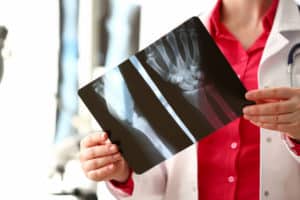Crushing Injury
Home » Personal Injury Resources » Types of Injuries » Crushing Injuries

A crushing injury can shatter bones and mangle soft tissue. After a crushing injury, you might suffer from permanent disabilities and disfigurement.
As a result, you could require expensive medical treatment and miss significant time from work. Your injuries might even force you to quit working entirely.
Below you will learn about the damage caused by a crushing injury and the compensation you can seek for these devastating injuries.
How Does a Crushing Injury Happen?

Crushing injuries happen when your body experiences pressure over an area. Doctors have no clear line between impact and compression.
But a crushing injury usually differs from an impact injury because the force gets applied:
- For a longer time
- Over a larger area
The resulting damage differs from the usual bruises, lacerations, and fractures characteristic of impacts.
What Types of Tissue Damage Can Result From a Crushing Injury?
A crushing injury causes some specific types of tissue damage. This tissue damage often causes more serious injuries and has a bleaker prognosis than a simple impact injury.
Shattered Bones
A shattered bone, also called a comminuted fracture, happens when a bone breaks into three or more pieces. As a result, the injury includes at least one bone fragment not attached to the broken ends of the bone.
Doctors must reattach all loose bone fragments so they can heal to the rest of the bone. To do this, doctors reconstruct the shattered bone using screws, plates, and rods. These fasteners keep bone fragments from moving so the body can knit them together.
If any pieces of bone are missing, too damaged, or too small, doctors may leave them out or replace them with bone grafts.
Comminuted fractures take significantly longer to heal than simple fractures. A comminuted fracture could take a year or longer to heal.
Mangled Soft Tissue
Crushing injuries can tear muscles, tendons, and ligaments. Torn muscles and tendons cause strains. Muscles give your body strength and movement. Tendons anchor muscles to bones.
Symptoms of strains include:
- Pain
- Inflammation
- Stiffness
- Weakness
- Spasms
When a crushing injury tears ligaments, you sustain a sprain. Ligaments hold bones together in your joints.
Symptoms of a sprain include:
- Pain
- Inflammation
- Limited range of joint motion
- Joint instability
- Bruises
Minor strains and sprains usually heal on their own with rest, ice, and anti-inflammatory drugs. These strains and sprains usually take four to six weeks to heal.
Occasionally, doctors will operate to repair a full-thickness tear in a ligament or tendon.
Crushed Blood Vessels
Damaged blood vessels will produce bruises. But crushing injuries can cause vascular trauma and permanently damage your blood vessels.
Vascular trauma can weaken the blood vessels leading to:
- Bleeding
- Bruising
- Poor circulation
- Susceptibility to blood clots
In severe cases, vascular trauma may damage a blood vessel so severely that it cannot carry enough blood to the crushed body part. Without the oxygen carried by your blood, the cells in the crushed body part will die.
Even if doctors can restore circulation to the crushed body part, the weakened blood vessel will remain vulnerable to subsequent injuries. It can produce blood clots, leading to heart attacks, strokes, and pulmonary embolisms. It can also leak blood, leaving the crushed body part weak.
Damaged Nerves
Nerve cells use a combination of chemistry and electricity to communicate with each other. When nerve cells get stretched or compressed, they can drop or produce errant nerve signals.
As a result of this nerve damage, your crushed body part might experience:
- Pain
- Numbness
- Tingling
- Loss of dexterity
- Paralysis
The intensity of the symptoms caused by nerve damage can range from uncomfortable to unbearable. Doctors can sometimes replace damaged nerves with a nerve graft. But in most cases, doctors cannot repair or replace a damaged nerve.
What Are Some Crushing Injury Complications?
Crushing injuries can lead to complications, including:
Crush Syndrome
Crush syndrome happens when large numbers of cells die from a crush injury. The dead cells release their contents into the bloodstream.
Your kidneys filter waste products from your blood. The volume of dead cells after a crush injury can overwhelm your kidneys leading to kidney damage or kidney failure. If your kidneys shut down, waste products will build up in your bloodstream, and you could suffer massive organ failure.
Amputation
When doctors cannot restore circulation, bone structure, or nerve function in a crushed body part, they will consider amputation. If a body part lacks circulation, the cells will die and cause gangrene.
A body part lacking bone structure will be permanently disfigured and might not function. Doctors may recommend amputating the part and replacing it with a prosthetic.
When you lose nerve function in a body part, it can become a liability. Without any touch sensations, your crushed body part could get injured without you realizing it. And without motor function, you will not be able to move it.
What Are the Risk Factors for a Crushing Injury?
Crushing injuries can happen in nearly any accident. But two types of accidents have a heightened risk of crushing injuries.
Workplace Accident
Workplaces are full of ways you can get crushed. For construction workers, the second-most common fatal injury happens when workers get caught in or between objects. For example, a workplace accident can result in a crushing injury if you get caught between a vehicle and a wall.
Another common workplace accident happens when a worker gets crushed by a falling or dropped object. You could crush your foot at work by dropping a heavy object onto it.
Traffic Accident
Traffic accidents can cause crushing injuries in many ways, including:
- Getting run over by a car in a pedestrian accident
- Crushing your foot when a car accident smashes your car and traps it
- Having your leg pinned under your motorcycle after a motorcycle accident
Crushing injuries can also happen if your vehicle rolls over and your roof collapses.
What Compensation Can You Get for a Crushing Injury?
You could seek compensation if your crushing injury resulted from someone’s negligence. This compensation can cover both your economic damages, including your medical costs and lost income, and non-economic damages, including pain and suffering.
A crushing injury can have catastrophic effects. You could suffer significant limitations on the functions of the crushed body part. You might even lose the body part to amputation. To learn more about the compensation you might receive for your crushing injury, contact or call M&Y Personal Injury Lawyers at 866-864-5477 for a free consultation.
